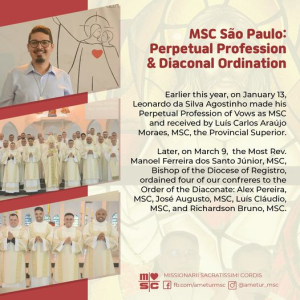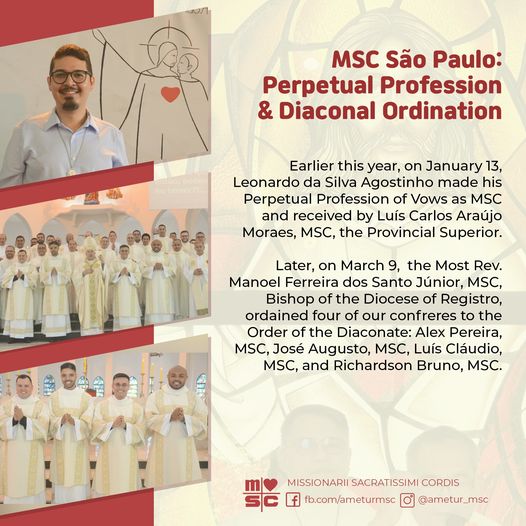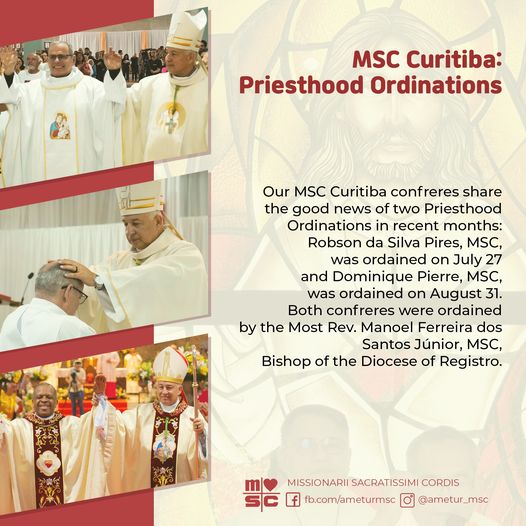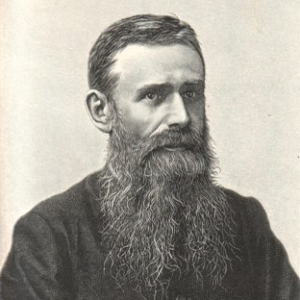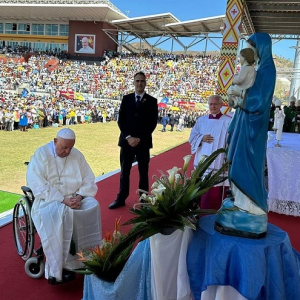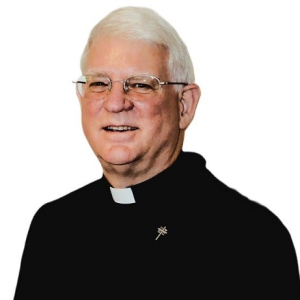Peter MALONE
12 Mighty Orphans
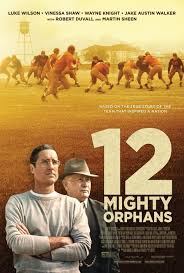
12 MIGHTY ORPHANS
US, 2021, 118 minutes, Colour.
Luke Wilson, Martin Sheen, Wayne Knight, Vanessa Shaw, Jake Austin Walker, Scott haze, Jacob Lofland, Robert Duvall, treat Williams, Larry Pyne.
Directed by Ty Roberts.
This is a film very much in the traditional American spirit, of country and patriotism, love of sport, especially football, appreciation of the underdogs.
It is based on a true story – however, quite a number of the facts and timelines have been altered for the drama.
In the aftermath of World War I (with a number of flashbacks of war action for the central character, Rusty Russell wounded, especially in his eyes but recovering), the film focuses on the Depression and its effect during the 1930s. In particular, it focuses on institutions for orphans, often looked down on in American society as second-class citizens.
Rusty Russell, already a top football coach, takes on the job at the Masonic institution for orphans in Fort Worth, Texas, travelling with his wife and family, his wife a successful English literature teacher. They are played by Luke Wilson and Vinessa Shaw.
The film shows the harsh life of the Institute, especially with one of the staff played by Wayne Knight, in charge of the printing business, exploiting the orphans, physical brutality towards them, and later revealed as embezzling money and colluding with the coach of an opposing team, a vengeful attitude towards Russell.
However, the focus of the film is on the orphans themselves, age 17, rough and ready, one with a particular chip on his shoulder and anger, gradually the group moulding into a team, getting gear from charities, working together with the coach who is inventive in his creation of play, becoming successful, opposed by powers that be with petty regulations and interpretation, the media intervening as well as to and ultimate success. However, with a sober realism, they lose the final championship match.
A number of veteran actors in supporting roles including Martin Sheen, at age 80, as the doctor assistant coach, a glimpse of Robert Duvall at age 90, and Treat Williams and Larry Pine as Roosevelt.
There is a fine tribute to the Russell’s as well as to each of the mighty orphans in the final credits, photos and an admirable list of achievements by each of them.
- Based on a true story? The alteration of facts and timelines? A tribute to Rusty Russell? His wife? Their work with the orphans, football and tactics, love of literature? The final tribute with the details of what happened to Russell and his wife, the 12 orphans themselves, achievement?
- A film of the American spirit, American football, sport, fans, even President Roosevelt, the Depression, the 1930s, poverty, lack of opportunity, the low status of orphans?
- The use of black-and-white photography, for World War I sequences, for the depression, the insertions? The atmosphere of the 1930s, Texas, the family travelling by car, the depressed communities, going to Fort Worth, the Masonic institution? The task of coaching the orphans? Of teaching them? The musical score?
- Russell and his story, the flashbacks to his experience in the trenches, the death of his brother, his blinding, his recovery? The recurring memories? His using his experiences to encourage the orphans? Married to Juanita, giving up a significant post, wanting to help the orphans? His daughters? His appearance and manner, glasses, difficulties with his eyesight? His explanation of his own background as an orphan?
- The Institute, the head, his concern about maintaining the workings, Frank Wynn, the printing, his bullying, hitting the students, his sneering attitudes, the rules, embezzling the money, his link with the rival coach, providing the birth certificate, his mistake, the confrontation with Russell, the hearings, his arrest?
- The orphans, their age, status, back stories, the mother abandoning Wheatie, Hardy, the death of his father, covered in blood, his resentments and anger? The lack of education? Interactions amongst themselves?
- The football theme: the opening, dressing room, the clashes amongst themselves? The rest of the story going back to arrive at this match?
- The boys themselves, their personalities, interactions? Hardy and his resentments, blood, shower, Snoggs trying to help? Continued manifestations of anger? The football field, rough, no shoes? The gradual building up of gear, shoes, pads, jerseys? Football issues? Scenes of training, boys’ reactions? Angers amongst themselves?
- The range of football matches, football scenes, the tactics, Russell’s daughter and her idea, the creative play, Russell changing play styles? The tough matches, the opponents, the referees?
- Doc Hall, age, no salary, his drinking, seeing the boys, a father figure, treating Hardy? Supporting Russell, recommending him? Assistant at the training, intervening in the crises, confronting authorities? At the games? His having to give up the drink?
- Juanita, supportive of her husband? The rough housing, settling in, her classes, enthusiasm, the boys and their learning?
- The rivalries, the hearings, Roy Kidd and the writing of the manual, his wanting to exclude the Mites, Doc Hall and the text? The hearings for their expulsion, his brother-in-law as the smug coach? The intervention of Amon Carter, his newspapers, watching the matches, his bets, links with the journalist, the reporting? The intervention of Roosevelt and the reversal of the decision?
- The hostile coach, setting up the big player to eliminate rivals? The hospitalisation of Fairbanks? Hardy, playing, his success, tactics? Eventually supporting the war cry?
- The failure to win, Hardy blaming himself, yet public support, fans, letters, demonstrations?
- The spirit of the Mites, the coach, love for football?
- The impressive tribute to the end and the careers of Russell and his wife and the orphans themselves, achievements?
Last Rifleman, The
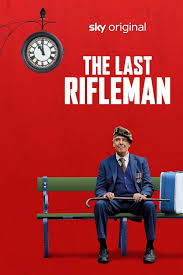
THE LAST RIFLEMAN
Ireland/UK, 2023, 95 minutes, Colour.
Perce Brosnan, Clemence Poesy, John Amos, Jurgen Prochnow, Ian McIlhinney, Samuel Bottomley.
Directed by Terry Loane.
This is a film which will entertain and inspire older audiences. It is an Irish-English production, focusing on an Irish character, a rifleman in World War II, and D-Day, some sequences of the fighting, the confrontation with the Germans, fear and heroism. While his friends have died, at the opening of the film, he is, as he states, 92 ¾. He is in an aged care home, with his wife of 68 years who has dementia, who dies.
Audiences who have seen Michael Caine and Glenda Jackson in the story based on the same characters and events, The Great Escaper, will note the similarities. But, of course, there are differences, English and Irish settings, various difficulties on travelling to the D-Day celebrations, the encounters along the way, the role of the media, the acclaim for both The Great Escaper and The Last Rifleman.
A great interest is the presence and performance by Pierce Brosnan, acting more than 20 years older than he is in real life, effective make up, a dignified personality, loyalty to his wife, loyalty to the memories of his friend, deciding to go to the D-Day celebrations for the first time returning.
The film is entertaining in the various steps for his travels, train, cab, bus, hitchhiking in the truck, the ferry to Normandy. And, encounters along the way, an earnest young man with a love of the music of Ennio Morricone and a pleasant anecdote and themes from The Mission, a fussy lady with her medications on a train, a very cheerful woman truck driver, a helpful cab driver, and a French woman (Clemence Poesy) and her two children who are able to smuggle him across the channel.
There is also an encounter with a German soldier, Jurgen Prochnow, and some mutual reflections, an encounter with an African-American soldier played by John Amos.
This is a quietly were reflective film about war and its consequences, on relationships, love and sadness, the dignity of older age and coming to terms with the past.
- Based on a memoir? (Comparisons with The Great Escaper?) Memories of D-Day, memories of war action, injuries and death? Living with the memories into old age? A story for the 21st-century audience?
- The Irish setting, the home for aged care, the rooms, dining room, offices? Travel in Ireland, cabs, buses, trains? The ferry to Cherbourg? The helicopter at the end? The French settings, the town, Normandy?
- Artie Crawford and his story? The flashbacks, the friendship with Charlie and Maggie, the photos, the beach? The scenes of action, confronting the Germans, the British and the Irish, the casualties? Artie and his fear, behind the tree? Charlie and his concern, helping Artie, going ahead, Charlie’s death?
- Artie, 92 ¾, in the home, waking, his room, going to Maggie, the 68 years of marriage, her dementia, feeding her the ice cream, her saying Charlie? His tenderness, the kiss, sitting in the room, the quietness of her death?
- Artie, the letters and photos, writing the letter to Charlie? Inviting Charlie to the 75th commemoration? The reality of Charlie’s death, Artie marrying Maggie?
- At the home, the discussions with Tom, the D-Day 75 years celebrations, Tom and reading the paper, phoning the journalist, the confrontations with the authorities at the home?
- Artie, the decision to go, packing, his health and medication, his age, sitting outside, the laundry van, escaping in the back of the van, £20 to the driver for directions, going to the station, the free travel for those aged, in the train, the lady with her medication, chatter, helping him? The delay in getting to the ferry? The assault by the young men? The help by the cab driver, the ride and the talk, the cabby’s tribute, no fee? In the bus, the young man, helping Artie to his seat with the case, the discussion, Morricone, the reminiscence that Artie met him in Verona with his wife, shook his hand, the playing of the theme from The Mission and Artie listening, the breakdown of the bus, Artie starting to walk, the young man with him, thumbing a lift, the French family refusing, the truck driver, the woman, the talk, Artie and his turn, diabetes, Coca-Cola and the sugar?
- The problems at the ferry, his outdated passport, the authorities? Juliette and her family, the family holiday, her health? Returning home, the van? Hiding in the van, on board, giving him the room, his turn, the nurse and the doctors, plan to get him out, the van driver, Juliette picking him up, the friendship with the children, discussions about the ice cream, the seeing him on television and the boy excited? The farewell and his thanks?
- The bus with the German soldiers, his attitude, some bitter memories, the conversation with the soldier, the reminiscences, gradual mellowing, singing A Long Way to Tipperary, the German and his young days, losing the war, discovering he was on the wrong side, the reconciliation, the German waving to the British troops and their waving back?
- Artie, the tourism office, going to the restaurant, encountering the American and his granddaughter, the conversations and reminiscences, the medals, the death of the American’s brother landing on D-Day, mutual respect?
- The journalist, given the story by Tom, flying to Paris, getting to Normandy, the tourist office, finding Artie, explaining the situation?
- The ceremonies, Artie having to face the truth that he was the last of the riflemen, going to the cemetery, Charlie’s grave, the memories, the media, the helicopter ride, Charlie and the acclamation?
- The sadness of the story, the nobility of the human spirit, age, dementia, the influence of the past, the possibilities of facing the past and facing the future, even in old age?
Unfit: The Psychology of Donald Trump
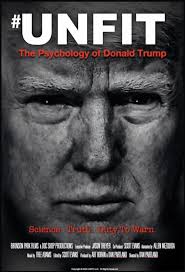
UNFIT: THE PSYCHOLOGY OF DONALD TRUMP
US, 2020, 83 minutes, Colour.
Directed by Dan Partland.
The Internet Movie Database has an accurately succinct summary: An eye-opening and shattering analysis of the behavior, psyche, condition, and stability of Donald Trump.
This documentary was released in 2020 during the presidential election year, the end of the Trump presidency and the election of the Democrats under the leadership of Joe Biden. And, of course, there was the uprising on January 6 and subsequent trials as well as the series of charges raised against Donald Trump after his being impeached twice. And his claim that the election was rigged against him.
The documentary, with material from the four years of the Trump administration, makes a case against Trump and his fitness for office.
There is quite a range of experts begin with George Conway. Conway was previously married to Trump’s Press Officer, Kellyanne Conway – and this film opening with her commentary about the truth or falsity of the numbers at the inauguration and her statement about alternative facts. George Conway, originally from the Philippines, a supporter of Trump, indicates the steps in his disillusionment. His comments recur throughout the film and are quite telling.
The range of experts includes John Gartner, Malcolm Nance and a range of experts (whose qualifications are listed before they speak) on psychology, on communication, a commentary on narcissism, the behaviour of a sociopath. There are black and white news footage sequences highlighting the career of Mussolini as well as Hitler, and parallels with Italy and Germany in the 1920s and 30s and the United States in the 21st-century. There is also a sequence showing the work of Jane Goodall with the chimpanzees in Africa, the behaviour in a group, the growth of the group, splitting into two, assertions of leadership.
Some anti—Trump commentators complain that the film, at 83 minutes, could have had greater depth. However, most audiences critical of Trump, fearful of Trump, the quickly persuaded of the truth of the opinion stated and appreciate the continued insights. (Clearly, there are comments from pro-Trump supporters who dismiss all the opinions, one commentator relishing the film and seeing liberals wallowing in their misery!).
With 2024, the election year, Trump re-nominating, Joe Biden withdrawing, Karmilla Harris emerging as the Democrat nominee, the film is certainly relevant.
However, the director, Don Partland, released two documentaries in 2024. There was God and Country (Looks at the implications of Christian Nationalism and how it distorts not only the constitutional republic, but Christianity itself.) And a second documentary about Trump, featuring George Conway again, John Gartner as an anchor personality, Malcolm Nance and others as well as fresh commentators: #UNTRUTH: The Psychology of Trumpism. Whilst reinforcing the statements about Trump, it looks at the psychology of divided America. And the IMDb description: Mental health experts analyze disinformation, false narratives, and untruths in American media and culture. It examines how profit-driven enablers and power-seeking politicians create divisions threatening democracy.
These descriptions of narcissism might be helpful in the diagnosis: True narcissism is a far deeper, darker issue.
Narcissistic personality disorder (NPD) is estimated to affect around 1% of the population, and is characterised by a grandiose sense of self-importance, a lack of empathy, an intense need for admiration, a deep envy of others, the belief they’reunique and deserving of special treatment, and a preoccupation with brilliance and unlimited power.
While many of us display some of these traits from time to time, it’s considered pathological when it’s a pattern of behaviours which impair a person’s daily functioning – with others often caught in the crossfire.
Note: Don Partland’s 2023 film, God + Country, is a further development of the theme, includes Donald Trump but focuses on the transition of many American Evangelical Christians being transformed into Christian Nationalists, culminating in religious motivation in the January 6th attack on the Capitol, 2021.
His 2024 documentary, #UNTRUTH: The Psychology of Trumpism completes the trilogy.
Thelma
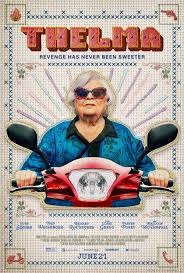
THELMA
US, 2024, 98 minutes, Colour.
June Squibb, Fred Hechinger, Richard Roundtree, Parker Posey, Clark Gregg, Malcolm McDowell.
Directed by Joshua Marston.
Lyricist Johnny Mercer once wrote “you’re either too young or too old…”. Here is a tale about a 94 year-old, a lot of it tongue-in-cheek, a lot of it quite hopeful, the proof that she is not too old.
She is a grandmother, Thelma, played by 94-year-old actress, June Squibb, a veteran character actress here getting a starring role. Her loving husband has died, she is living alone, but happily reliant at times on her grandson, Daniel (Fred Hechinger), genial, hert confidante, helping her when she is busy on her computer. They watch television and Thelma has a soft spot for Tom Cruise doing his own stunts in the Mission Impossible films.
Daniel is 24, thinks that he is not good at anything much, has a fussy overprotective mother, Parker Posey, and a demanding father (Clark Gregg) who is rigid in his interpretation of obligations.
However, the core of the story is one that will resonate with older audiences (and younger audiences who have been victims), the scam. Thelma receives a phone call, a voice impersonating Daniel, a plea for ransom money, her going to the bank, withdrawing it, posting it – and then the realisation of the scam.
Thelma is both humiliated and annoyed, and decides to take the matter in hand, relying on an old friend, Ben (Richard Roundtree, merely 80, Shaft himself over 50 years earlier, his last feature film). They form a very genial screen couple, June Squibb doing her own stunts – though they are mainly on a scooter with Ben, racing through the streets of LA. She also borrows a gun from another elderly housebound friend!
The enjoyment of the film is watching June Squibb, the actress enjoying herself in this role, entering into it wholeheartedly. Daniel is a sympathetic character and we like Ben. Not so much the fusy parents, very irritating!
And there is a cameo from Malcolm McDowell (only 82) as the villain.
What might be called an enjoyable action romp and an affirmation of grey power!
- Thelma, June Squibb, aged 94, her screen presence and performance?
- Themes of age and ageing, transcending age limits? Her fondness of looking at Tom Cruise and his stunts, Mission Impossible?
- Alma, her story, background of her long marriage, sadness at the death of her husband, living alone, managing, her daily routines? Her bond with her grandson, his care for her, conversations, driving? Her daughter fussing, stripped, her son-in-law and his ideas and mouthing them?
- The importance of Thelma working on the computer, older audiences identifying with her, the help from Daniel? The later use of the skills?
- The phone call, the impersonation of her grandson, the ransom, the phone connection, the directions, going to the bank, withdrawing the money, posting it? Her later finding the address?
- The situation and her determination, the strategy, going to the aged care home, visiting Ben, the bonds in the past, their mutual friends, regrets at deaths? The production of Annie and his role? Is Scooter, Thelma, it, the chase through the hospital, out into the streets, his decision, to get back for the performance, riding through the city, his exasperation is, their getting lost, separation, her falling, his coming to help her up (and his story about learning how to lift patients)? They’re persevering, finding the address?
- Visiting miner, living alone, old-age, memories, and Thelma getting the gun?
- Daniel, his age, self-image, not capable of doing things, the bond with his grandmother? His parents, the fuzziness, comments, protectiveness?
- The issue of film are being lost, her alarm and her removal? The family coming to the aged care Centre, the two interrogating the family, sympathy, comic touches? The Detective and the interviews? The family staying, anxious?
- Thelma and the service station, the photo, turning up on Daniel’s phone, tracking her down, the pursuit, his driving (without the licence despite his father), arriving, Thelma throwing the alarm over the fence, getting away?
- At the post office, following Michael, the shop, the owner, the antiques, the setup for the scam? The confrontation, denials, Thelma being funded, pulling the gun, the hearing aid contact with Ben, Michael escaping, bend tripping him? The confrontation with the owner, the computer, Thelma drawing on her skills, contact with Daniel, the transfer and success?
- Reconciliation with the family, affirmation of Daniel, arriving back for the performance of any? The bond with Ben?
Golden Delicious
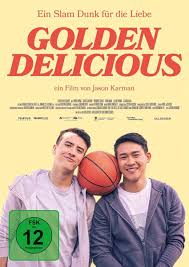
GOLDEN DELICIOUS
Canada, 2022, 120 minutes, Colour.
Cardi Wong, Chris Carson, Permiss Sehat, Ryan Mah, Leeeah Wong, Zavien Garrett, Jesse Hyde, Hunter Dillon.
Directed by Jason Karman.
Golden Delicious is, in fact, the name of a restaurant. In the setting is the Chinese community in Canada, their being part of the broad Canadian community, their special traditions, adaptation to the American continent and way of life.
At the centre of the story is a 17-year-old son of the restaurant owners, Jake (convincingly genial performance from Hardy Wong). He is a keen photographer. He has a girlfriend who is avidly devoted to him. His father, a basketball player but injured and withdrawing, dominates his son for practice. His mother is weary at the restaurant. His sister wants to continue developing cooking of Chinese food, something her mother is against.
At school, Jake has some friends, they play basketball together, and dominated by the captain.
The screenplay indicates to the audience that this is a coming-of-age film, that it is a film where the young man will become more aware of his sexual orientation, experiences difficulties and homophobia, come to terms with it and live acceptably in society, with his family and friends.
The focus of this growing awareness is the arrival of the next-door neighbour, Alex (Chris Carson) openly gay, skilful at basketball, the growing friendship between Jake and Alex. Not without self awareness, the impact for the girlfriend, for the school friends, attacks by the homophobic captain, the parents and sister coming to terms with the revelation when it is cruelly exposed on social media.
However, most of the atmosphere of the film is very genial with a happy ending – and a rather gentle comeuppance for the homophobic, simply showing him at the dance approaching the girls and their deciding to walk away from him, leaving Jake and Alex happily together.
A film which will resonate with young men discovering in coming to terms with their sexual orientation and a film which might be very helpful for parents.
- The title, the name of the restaurant, the tone?
- A Canadian film, the Chinese-Canadian community? In the context of the wide Canadian community, English-speaking, education, sport, relationships?
- The city setting, homes, school, streets, the restaurant, realistic atmosphere? The musical score?
- Jake’s story, his age, teenage, his place in the family, relationship with Janet and their discussions, rivalries? His relationship with his parents, his mother support, his dominating father, the basketball practice, insisting, causing the injury, the father’s injury and his limp? At school, dithering about university applications? His camera, love of photography? The relationship with Valerie, her devotion to him, over the years, his hesitations with her, her insistence, the sexual encounter and the aftermath? His noticing Aleks next door, the attraction, basketball dribbling? Photographing him?
- The background of the family, the narration about the pregnancy, the young marriage, inheriting the restaurant, scenes of the restaurant, the demands, Andrea and her being weary, bickering with George? Their arriving’s home separately? Her criticism of Janet’s cooking, not wanting her to continue with the Chinese style, inherited from the grandmother whose picture is on the wall, but Janet following her dream, cooking the meal, sharing with Jake, her mother tasting it but refusing? The increasing clash, the separation?
- Aleks, moving with his family, going to school, basketball skills, openly gay? Befriending Jake, defending him? The group playing basketball, Ronald and his sneers, at the game, in the corridors, the fights? His homophobia and aggression? The fight and breaking Jake’s camera?
- Jake, how aware of his orientation, his genuine friendship with Valerie, but his hesitations, Valerie as a character, love, determination?
- Jake and Aleks watching the television, Jake and the kissing, Aleks and the stripping, interrupted by the parents? The aftermath? Jake going with Valerie to the party, Aleks and his approach, going upstairs, the sexual encounter, Valerie discovery, going downstairs, everybody with their camera, the exposure?
- The consequences for Jake? Going by himself? Social media? Janet and her discovery, his parents? The family coming together, seeking out Jake, supportive of him?
- The reconciliation with Aleks? The preparation for going to the dance? Dressing in the suit, the rainbow tie? The support of his parents?
- At the dance, their being together, the continued support of Gary and Sam, the relationship, dancing together?
- Ronald, the quiet treatment of his comeuppance, approaching Valerie, the girls walking away from him, his being alone?
- Jake, true to himself, acknowledging his orientation, the relationship with Aleks, his future?
Touch/ 2023

TOUCH
Iceland/UK, 2024, 120 minutes, Colour.
Egill Olafsson, Koki, Palmi Kormakur, Masahiro Motoki, Yoko Narahashi, Ruth Sheen.
Directed by Baltasar Kormakur
This is a very moving drama from Iceland. The central character is ageing, health deteriorating, a doctor advising him to come to terms with any problem that has been gripping him over the years. He is Kristofer, widower with a daughter, but long memories.
As might be expected, there are two time eras in this film, the present with the ageing Kristofer, and many flashbacks which build up a strong and vivid picture of himself when young, his early life, and encounters which changed his life but which came to an abrupt and mysterious and.
In fact, the principal flashbacks are to London in the 1970s, Kristofer student of economics there, joining in protests of the time, but giving up on the studies and taking up a job in a Japanese restaurant in central London. He feels at home there. He learns some of the language. He learnd some of the ways of cooking. The owner, a refugee in the 1950s from Japan to London, a native of Hiroshima and the atomic bomb, the aftermath, with his young daughter, highly competent, initially wary of Kristofer.
But, we see the buildup of the relationship, Kristofer finding a zest in life, and in love with the daughter, Miko (played by Koki). And one day he goes to the restaurant and finds it closed, the family gone.
Again in the present, Kristofer goes back to London, finds the site of the restaurant, tracks down one of the workers there at the time, gets some information and, despite protests from his daughter, decides to go to Japan to discover the truth, to bring some calm to the anguish that he has experienced for half a century.
And audiences will find the sequences in Japan, a visit to Hiroshima (and quite a telling impact in being reminded of what happened with the bomb and its effect on
those who lived in the city), and his search for Miko and whether he will find her or not, engaging..
Director,Baltasar Kormakur was a pioneer in the 2000a of strong Icelandic drama. By 2010, he was making action films, especially in the United States with an American cast. Now his return to serious drama – and audiences will be thankful for this.
- The tone of the title? Communication? Tenderness? The long absence of touch?
- The work of the director, stories from Iceland, his dramas, the period of his action dramas, this film as a culmination of his work?
- The contemporary Icelanders settings, the terrain, the seasons, homes, towns, airport, leaving Iceland? The London settings, the 2020s, the site of the restaurant, the changes, the meetings? The London settings of the 1970s, students, protests, accommodation, jobs, the restaurant, the Japanese atmosphere, the streets and atmosphere London at the time?
- The Japanese locations, Tokyo, Hiroshima, the countryside? Modern, the buildings, parks, streets, high-rise? The flashbacks to Hiroshima in the past?
- Kristofer and his story, his age, the doctor, the diagnoses, physical condition, deteriorating mental condition, the advice to resolve any worries or concerns? His daughter and the phone calls, her concern? His disregard of them? The audience gradually building up the picture of the 50 years of the past, returning to Iceland, his work, marriage, the daughter?
- His decision to go to London, the airport, arrival, London changed, accommodation, seeking out the restaurant, its change, the proprietor? Tracking down the worker from the past, aged care, her giving him the information?
- The portrait of Kristofer in London, age, weary, anxious, searching? The decision to go to Japan?
- The insertion of the various flashbacks, Kristofer young, the background in Iceland, work, fishing, student in England, economics, fellow students, their bonding, camaraderie, the protests, the putting down of the protests? His ideology, giving up the studies, looking for a job?
- The Japanese restaurant, the proprietor, his asking for the job, his glimpse of Miko, his reaction, her reaction – the later revelation that she advised her father not to employ him? His discussion with his friends, their disbelief? His return, the owner hiring him, the conversations, the other workers, the woman and her background, the Opera singer, the atmosphere, the customers?
- Kristofer, taking to cooking, learning Japanese, the communication, Mico and the discussions with her, the bonding? Falling in love, the meetings, secrecy, in the flat, Mrs Ellis and her reactions and advice?
- The family background, quiet, Hiroshima, the decision to leave, no communication with Kristofer, the disappearance? The impact on him? 50 years?
- In Japan, getting the address for Miko, meeting the lady from the apartment, her arranging the contact, Miko and Kristofer reuniting, the years that had passed, Miko and her age, health, her life, her regrets of losing Kristofer?
- The bonding, the past years, sadness, joy in finding each other?
Developments in the 3 MSC Brazilian Provinces
Some Significant September Days for the Chevalier Family, 2024
Some Significant September Days for the Chevalier Family, 2024
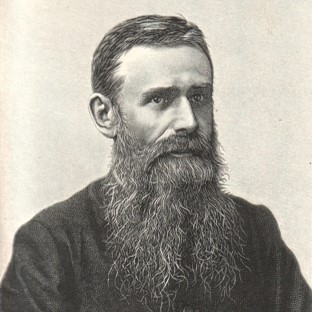
Archbishop Andre Navarre MSC, PNG pioneer, has several mentions this month. Mother Marie Louise Hartzer appears quite a number of times this month, the death of her husband, memories of her two sons, her meeting with Jules Chevalier, her vows.
An observation: September seems a busy month for electing the MSC Superior General (and a caution about September 28th, the day of death for two of them), as well as a busy month for appointments and ordinations of Bishops. And of the erection of Provinces and Sections.
1 September, 1860
The first Roman pilgrimage of Father Chevalier.
1 September, 1881
The first missionaries for Melanesia leave from Barcelona.
1 September, 1897
The erection of the German MSC Province. Blessing of the first MSC house in Hiltrup, Germany.
1 September, 1899
First 8 candidates of the MSC Sisters are received as postulants in Hiltrup.
1 September, 1900
Erection of the Italian MSC Province.
2 September, 1920
Arrival of the first MSC in Manado, celebrities, Indonesia, including Msgr Vesters, later Bishop.
2 September, 1956

Death of Brother Robert South, first Brother of the Australian province.
3 September, 1901
The Congregation of Bishops and Regulars grants and indult authorising Father Chevalier to announce his position as Superior General.
4 September, 1861
Father Maugenest becomes the first MSC to be parish priest of St. Cyr, Issoudun. He remains in this position until 31 December, 1871.
4 September, 1882,
Father X. Deidier leaves Issoudun for Madeley, England, to open the first MSC house there, and Apostolic School.
4 September, 1923
Mission apostolate of MSC Sisters commences in New Ireland, PNG.
4 September, 1945

The missionaries imprisoned by the Japanese during WWII in Ramale Valley, Papua New Guinea, are set free. The movie, entitled Sisters of War, produced in 2010 by an Australian film company, tells part of this story.
5 September, 1907
This date commemorates the opening of a 'special' MSC General Chapter which revised the Constitutions in the spirit of the "Roman Norms" of 1901. This Chapter occurred only a few weeks before Father Chevalier's death. He could not be present at the Chapter.
6 September, 1962
Father Karel Verwilghen, from the Netherlands, is shot in San José Nueva Ecija, Philippines. He died on 8 September in Quezon City, Philippines.
6 September, 1985
Foundation of the MSC Mission in Curaçao, Santa Maria parish.
7 September, 1978
Father R.Paglia, appointed Prelate Nullius and Bishop of Pinheiro, ordained in the Chapel of Villa Formosa, San Paolo, Brazil, the first MSC Bishop from Brazil.
8 September, 1869
The Archbishop of Bourges, Monsignor de La Tour d'Auvergne blesses Our Lady of the Sacred Heart Chapel in Issoudun and consecrates the altar. The coronation of the statue of Our Lady of the Sacred Heart takes place this day in the name of Pope Pius IX.
8 September, 1876
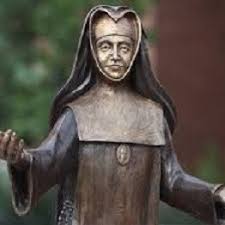
Father Chevalier meets Marie-Louise Hartzer for the first time.
8 September, 1877
First profession of the first Irish MSC, John Mary Neenan.
8 September, 1908
First General Chapter of the Daughters of Our Lady of the Sacred Heart Thuin, Belgium.
9 September, 1860
Father Chevalier’s first Roman pilgrimage: audience with Pope Pius IX.
9 September, 1884
Five Daughters of Our Lady of the Sacred Heart make their first vows. Marie-Louise Hartzer is among them.
9 September. 1911
Erection of the Australian FDNSC Province.
10 September, 1892
The MSC General Council accepts 16 scholastics for perpetual vows, among whom M.Rascher, killed in the Bainings in 1906; K.Offermans, the first Dutch provincial; and J.Wemmers, the first Dutch general assistant (1905-1911).
11 September, 1958,
A group of Irish FDNSC nursing Sisters take charge of the mining hospital at Mangula, Southern Rhodesia (now Zimbabwe).
11 September, 1961
Ikela (Zaire) becomes a diocese and is entrusted to the South German MSC province, Father Joseph Weigl MSC becomes its first Bishop.
11 September, 1969
Beginning of a special MSC General Chapter of Renewal (September 11-November 14), during which the Documents of Renewal were written.
12 September, 1855
L'abbé Caillaud, the General Vicar at the time, blesses the humble chapel (barns) in Issoudun and gives to the first two members of the society, Jules Chevalier and Emile Maugenest, the name Missionaries of the Sacred Heart of Jesus. It was on this very day that Jules Chevalier thought, for the first time, of the title "Our Lady of the Sacred Heart".
12 September, 1869
Opening of the first MSC novitiate at Montlucon, France. Father Guyot is the first Novice Master.
13 September, 1884
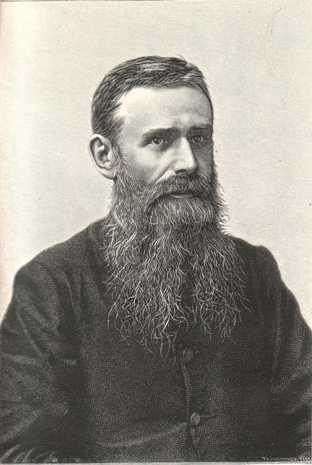
Father Navarre leaves New Pomerania (New Britain, PNG) for Thursday Island, gateway to Papua New Guinea.
13 September, 1891
Departure of the first FDNSC for New Britain.
13 September, 1901
Mother Marie-Louise Hartzer makes her application to the French Government for the authorization of the Congregation as exacted by the law of 1 July, 1901. This fact prevents the local authorities at this time during the political-religious unrest from affixing seals to the FDNSC mother house in Issoudun.
13 September, 1912
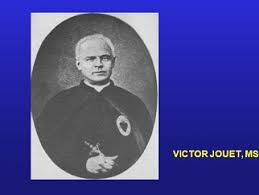
Father Franciscus Maria Victor Jouët dies in Rome. He is buried in Marseilles in the south of France, in his original diocese. On 2 July, 2003, his remains are interred in the Crypt in the Basilica in Issoudun.
13 September, 1947
Father Patrick McCabe (Australia) is elected Superior General (1947-1958).
14 September, 1902
Departure of the first seven MSC Sisters from Hiltrup for New Pomerania, New Britain, Papua New Guinea.
14 September, 1989
Erection of the PNG Province of the Missionaries of the Sacred Heart.
15 September 1925
A first group of Belgian FDNSC, together with five MSC, leave Antwerp as missionaries for the Belgian Congo (Zaire).
15 September, 1958
Father Joseph van Kerckhoven, Belgium, is elected Superior General (1958-1969).
15 September, 1970
The Dominican Republic becomes a provincial Administration of the MSC.
17 September, 1861
Father Maugenest is appointed Parish Priest of St Cyr, Issoudun.
17 September, 1932
Father Christian Jansen, Netherlands, is elected Superior General (1932-1947).
18 September, 1981
Father Kees Braun, Netherlands, is elected Superior General.
19 September, 1869
Victor Hartzer, husband of Marie-Louise Hartzer, dies in Vesoul, France, after being married 11 years. Together they had two sons: Marie Victor Fernand (born 1858) and Marie Léopold (born 1860). Both sons became MSC Priests.
20 September, 1900
The first MSC Superior, Father Field, arrives at Québec, to prepare for the arrival of the French scholastics.
20 September, 1905.
The Marshall Islands are erected as an independent Apostolic Vicariate separated from the Apostolic Vicariate New Pomerania, new Britain, PNG. They are entrusted to the MSC already working there.
21 September, 1886
Father Deidier and the Apostolic School moved from Madeley to Glastonbury, England. The English Annals will be published from there
21 September, 1930.
The first two Filipino MSC take their vows.
21 September, 1940
Father J.Vrakking MSC, Netherlands, appointed first Bishop of Surigao, Philippines, ordained Bishop at Cebu.
21 September, 1953,
Argentina erected as an MSC Section, entrusted to the Spanish Province.
21 September, 1987
Foundation in El Salvador by MSC of the Central American Region.
21 September, 1988
Father Luke Matlaterea MSC, PNG, appointed Bishop of Bereina, ordained by Bishop Bundevoert MSC.
22 September, 1889
Father Verius, appointed Vicar Apostolic of New Britain, ordained Bishop at Yule Island. On December 28 the appointment was changed to Episcopal Coadjutor to Msgr Navarre.
22 September, 1925
Translation of the remains of Msgr Navarre (1836-1912) to Yule Island.
23 September, 1924
The first Belgian MSC go to Belgian Congo (Zaire), leave Antwerp.
23 September, 1942
Death of Father Peter L’Esperance, Pro-Provincial of USA-Canada from 1910-1939.
24 September, 1881
The novices of Father Piperon, who arrived in the Netherlands, November 1880, after having been expulsed from France, make their first profession. Among them is Hubert Linckens, who will later become the historical founder of the MSC Sisters.
24 September, 1896
Brother Archibald Shaw (“ Brother Placid”, Australia) professed on Yule Island after Novitiate in the missions.
24 September, 1922

Last Spiritual Testament of the founder of the MSC sisters, Father H.Linckens MSC, for the members of the Congregation.
25 September, 1869
The first MSC General Chapter elects Father Chevalier as First Superior General. Fathers Piperon, Vandel, Bazire and Guyot are elected as his assistants.
26 September, 1864
Father Chevalier sends his booklet “Plan of the Society of the Missionaries of the Sacred Heart “to Father LeBlanc.
26 September,
Mary Ryan, the sixth postulant and first Irish girl to enter the FDNSC Congregation, a teacher, arrives at Issouodun.
26 September, 1967
Venezuela is erected as MSC Section, entrusted to the Irish Province.
26 September, 1982
Father Joseph Tethool MSC (Indonesia) appointed auxiliary of Ambon, ordained at Ambon.
.
26 September, 1889
Marie-Louise Hartzer makes her perpetual vows.
27 September, 1869
Jules Chevalier and his first companions make their perpetual vows at the end of a retreat preached by Father Ramière, SJ.
28 September, 1869
The house at Issoudun is canonically erected.
28 September, 1972
Father Patrick McCabe, Australia, dies at Sydney, Superior General from 1947-1958.
28 September, 1974
Death of Father Joseph van Kerckhoven, Belgium, Superior General from 1958-1969.
29 September, 1882
The first three MSC, with Father Navarre arrive at Matupit, New Britain, PNG, after travelling for 13 months.
29 September, 1936
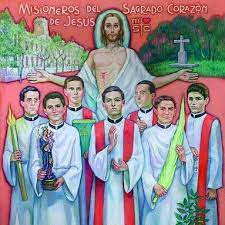
Four Fathers and three Brothers, all from the community of Canet del Mar, killed, Spain, during the Civil War. Three other Fathers from Barcelona and one Brother were killed on other days.
30 September, 1927
The first three MSC leave Marseille for the mission of central Java, Indonesia.
Some post-script photos of Pope Francis’ visit to PNG
Some post-script photos of Pope Francis’ visit to PNG



And a further PS.
Frank Andersen MSC was contacted for copyright permission to sing The Fulness of God at the Papal Mass in Port Moresby.



Short Biography of Fr. Michael I. Miller, MSC
Short Biography of Fr. Michael I. Miller, MSC, US Provincial
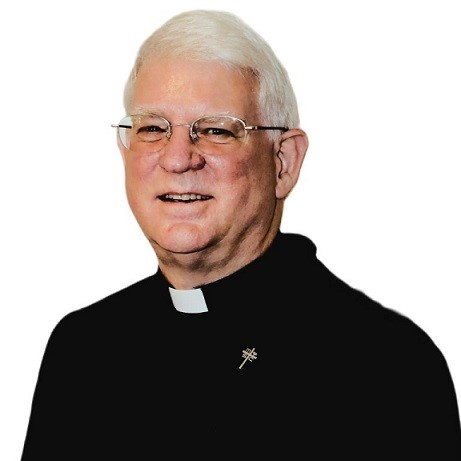
I am Fr. Michael I. Miller, MSC, the newly elected Provincial of the MSC-USA Province. As of September 1, I begin this new ministry to serve the members of the province and other members of the Church.
I professed religious vows in 1978 and was ordained a priest in 1985. My first assignment was as parochial vicar in Holy Family parish, Nazareth, PA. In 1989 I accepted the assignment to be a missionary in Colombia, South America. While there I was pastor at two parishes, worked as a formation director for our theology students, served our MSC community as Sectional treasurer and volunteered as a chaplain at Kennedy Hospital in Bogota’. I also supervised the construction and completion of building the “new” (begun in 1986) church at St. Margaret Mary parish in Bogota’. When I was the formation director of our theology students in Colombia, many of them were recipients of scholarships from the Foundation.
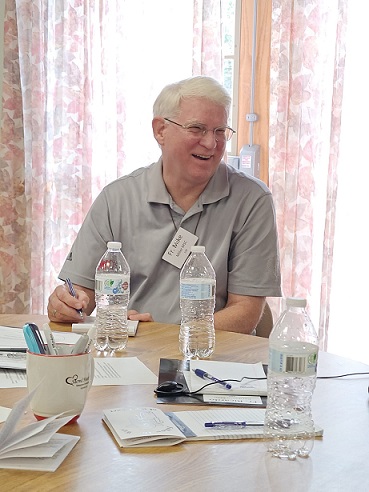
In 2005 the provincial assigned me to be pastor of St. Therese of the Child Jesus parish, Aurora, IL, where I served for 13 years. Then Father General, Mario Abzalón Alvarado Tovar, appointed me as the Secretary General in Rome where I ministered until this current appointment.
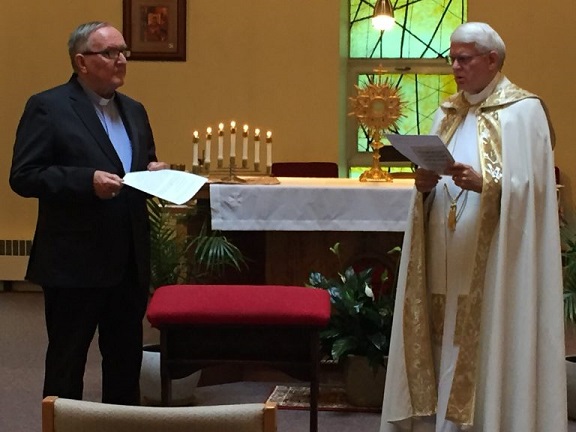
My term as provincial is for three years. By the grace of God, I hope to be worthy to serve those I meet. Please pray for me as I will for you.
